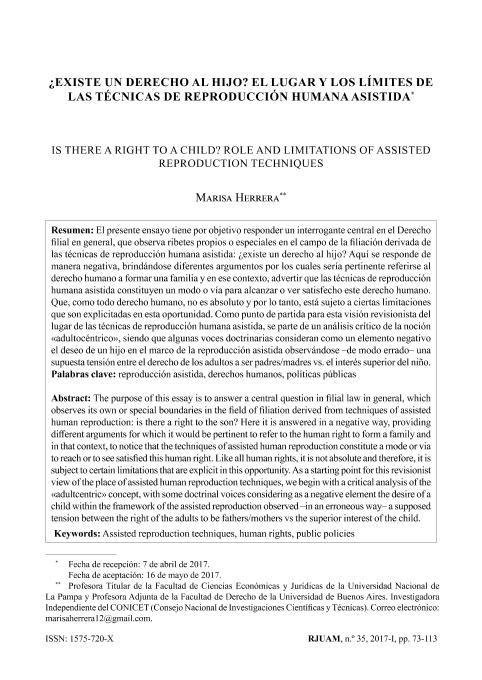Mostrar el registro sencillo del ítem
dc.contributor.author
Herrera, Marisa

dc.date.available
2019-04-04T19:40:44Z
dc.date.issued
2017-12
dc.identifier.citation
Herrera, Marisa; ¿Existe un derecho al hijo? El lugar y los límites de las técnicas de reproducción humana asistida; Universidad Autónoma de Madrid; Revista Jurídica de la Universidad Autónoma de Madrid; 35; 12-2017; 73-113
dc.identifier.issn
1575-720X
dc.identifier.uri
http://hdl.handle.net/11336/73196
dc.description.abstract
El presente ensayo tiene por objetivo responder un interrogante central en el Derecho filial en general, que observa ribetes propios o especiales en el campo de la filiación derivada de las técnicas de reproducción humana asistida: ¿existe un derecho al hijo? Aquí se responde de manera negativa, brindándose diferentes argumentos por los cuales sería pertinente referirse al derecho humano a formar una familia y en ese contexto, advertir que las técnicas de reproducción humana asistida constituyen un modo o vía para alcanzar o ver satisfecho este derecho humano. Que, como todo derecho humano, no es absoluto y por lo tanto, está sujeto a ciertas limitaciones que son explicitadas en esta oportunidad. Como punto de partida para esta visión revisionista del lugar de las técnicas de reproducción humana asistida, se parte de un análisis crítico de la noción 'adultocéntrico', siendo que algunas voces doctrinarias consideran como un elemento negativo el deseo de un hijo en el marco de la reproducción asistida observándose - de modo errado - una supuesta tensión entre el derecho de los adultos a ser padres/madres vs. el interés superior del niño.
dc.description.abstract
The purpose of this essay is to answer a central question in filial law in general, which observes its own or special boundaries in the field of filiation derived from techniques of assisted human reproduction: is there a right to the son? Here it is answered in a negative way, providing different arguments for which it would be pertinent to refer to the human right to form a family and in that context, to notice that the techniques of assisted human reproduction constitute a mode or via to reach or to see satisfied this human right. Like all human rights, it is not absolute and therefore, it is subject to certain limitations that are explicit in this opportunity. As a starting point of this revisionist view of the place of assisted human reproduction techniques, we begin with a critical analysis of the 'adulcentric' concept, with some doctrinal voices considering as a negative element the desire of a child within the framework of the assisted reproduction observed - in an erroneous way - a supposed tension between the right of the adults to be fathers/mothers vs the superior interest of the child.
dc.format
application/pdf
dc.language.iso
spa
dc.publisher
Universidad Autónoma de Madrid

dc.rights
info:eu-repo/semantics/openAccess
dc.rights.uri
https://creativecommons.org/licenses/by-nc-sa/2.5/ar/
dc.subject
Filiación
dc.subject
Reproducción Asistida
dc.subject
Derecho al Hijo
dc.subject.classification
Derecho

dc.subject.classification
Derecho

dc.subject.classification
CIENCIAS SOCIALES

dc.title
¿Existe un derecho al hijo? El lugar y los límites de las técnicas de reproducción humana asistida
dc.title
Is there a right to a child? : role and limitations of assisted reproduction techniques
dc.type
info:eu-repo/semantics/article
dc.type
info:ar-repo/semantics/artículo
dc.type
info:eu-repo/semantics/publishedVersion
dc.date.updated
2019-04-03T13:12:13Z
dc.identifier.eissn
2174-0844
dc.journal.number
35
dc.journal.pagination
73-113
dc.journal.pais
España

dc.description.fil
Fil: Herrera, Marisa. Universidad de Buenos Aires. Facultad de Derecho; Argentina. Consejo Nacional de Investigaciones Científicas y Técnicas; Argentina
dc.journal.title
Revista Jurídica de la Universidad Autónoma de Madrid
dc.relation.alternativeid
info:eu-repo/semantics/altIdentifier/url/https://revistas.uam.es/revistajuridica/article/view/8900
Archivos asociados
